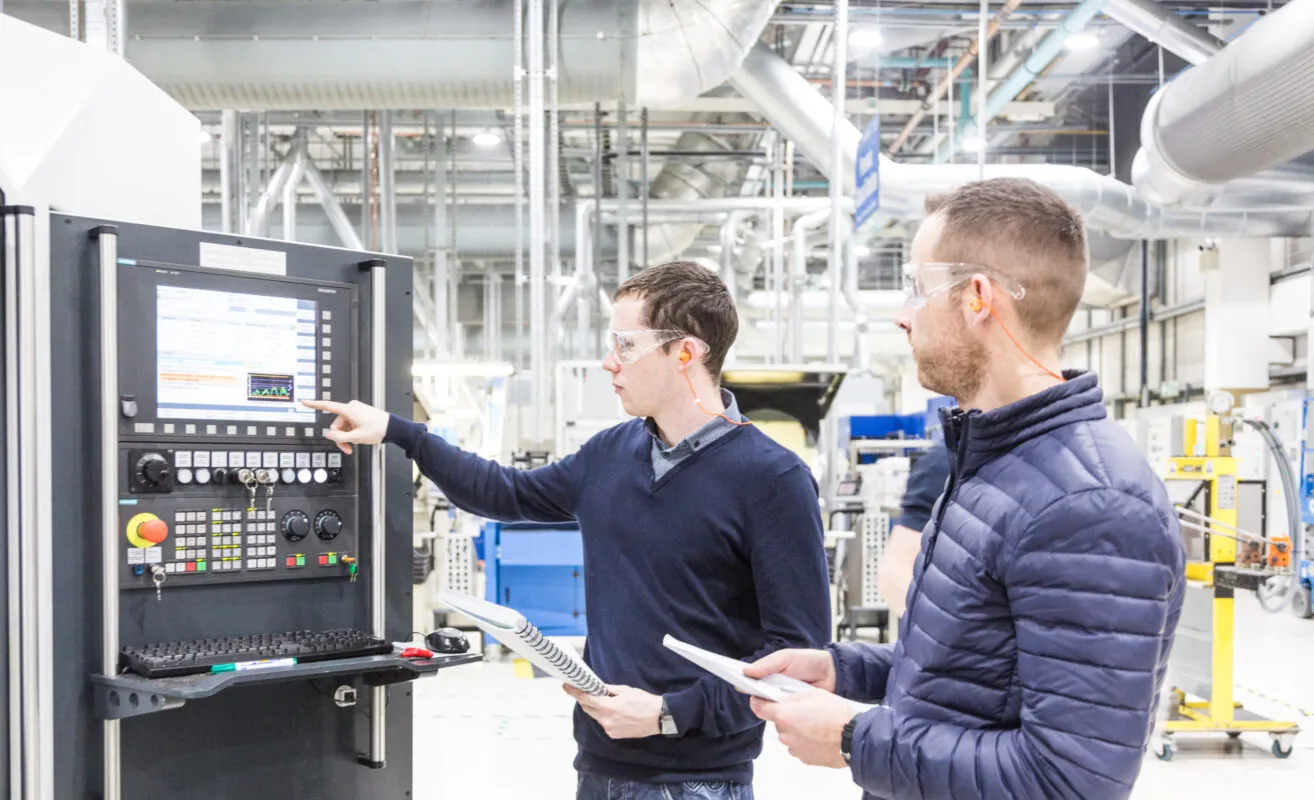Courses
Admissions & Support
Course Search
Courses
Admissions & Support
Course Search
Our Services
Our Community
Course Search
Governance
Professional Services
Location: Athlone
years: 1

This programme is designed for those in Technical Management Roles or aspiring to take on more management responsibility in an Applied Engineering setting. The course is designed to combine specialised engineering knowledge and skills with enhanced theory and practice in Engineering Management. The course has been designed by Engineers, to develop Engineering literate Managers. It aims to meet the needs of a changing engineering environment and address critical management skills gaps in industry.
Level 8 Honours (Grade 2.2) Degree in an appropriate Engineering, Computing, Manufacturing or Construction discipline.
Graduates who hold equivalent qualifications in related disciplines or who have relevant industrial experience will be considered for places on
a case-by-case basis in line with TUS RPL policy.
In line with TU policies, non-native English speakers are required to have an IELTS level of 6.5 or higher.
Strategic Management and Leadership
Credits: 10
Data Visualisation
Credits: 5
Businesses often encounter challenges is their inability to connect the dots when presented with large volumes of data. Hidden within this data lie critical insights that can help propel businesses forward. One of the major challenges is understanding an extrapolating useful information when looking at raw data alone. Knowing how to connect to, structure, visualise and disseminate this data allows businesses to evaluate performance, trends, new strategies and relationships to name but a few. In this module, learners will learn how to work with data (stored locally or remotely) to generate live dashboards, interactive reports, charts and graphs., which will then be published through a variety of mediums, to help unlock key business insight quickly and effectively.
Financial Statement Analysis
Credits: 5
Research Methods & Professional Practice
Credits: 10
This module will equip learners to critically explore the development and completion of applied research methodologies using structured, responsible tools and actions while imbuing learners with work-ready skills for industrial practice. The students will be introduced to the key concepts involved in research and project management and develop their understanding of the uses and relevance of the major methodologies employed. The requirement for ethics and social responsibility are emphasised throughout, inclusive of data collection and compilation, project planning and dissemination of results.
Resource Economics
Credits: 10
Intelligent Design & Modelling
Credits: 10
Team based project work is a distinctive component of the applied learning process in Engineering. The purpose of the module is to give students the opportunity to complete an applied research/development/consultancy project, or produce a research paper relevant to industry practice utilising the skills and knowledge gained throughout the programme via integration of the curriculum content. This will require the integration of the curriculum content, whereby previous cross modular links are consolidated and the knowledge and skills accrued throughout the programme are applied to define, investigate, implement and analyse a solution to an authentic industry focused project. The learner will work as part of small focused teams on this targeted multidisciplinary project.
Data Analytics
Credits:
Data analytics is an area of increasing importance and interest to organisations. Data analytics techniques offer huge potential in the creation of new knowledge products and services in addition to the enhancement of existing products and services. This module addresses the application of data analytics techniques to real-world business problems and the preparation of data for such scenarios.
Innovation & Project Management
Credits:
To cover the complexity of managing projects of various types (product, service, improvement and change) at every level in increasingly challenging business environments.
To provide students with an understanding of the theory, principles and practice of Innovation and Project Management in organisations.
The key focus of the module will be on the tools and techniques underpinning the selection, planning, implementation monitoring and control of projects within an organisation that support both product and service projects at operational level and strategic level
Resource Economics
Credits: 10
This module is designed to provide learners with fundamental knowledge of microeconomics and macroeconomics as applied to the engineering sector. Learners will be exposed to specific areas such as energy demand analysis, energy demand management, competition, markets and the economics of environmental impact as well as the economic drivers affecting engineering companies globally.
Community Energy Development
Credits: 5
This module will develop the ability to critically assess the value of a potential community project. The module develops an understanding in areas such as planning and grid connection, financial feasibility, ownership and sources of finance, construction approaches and due diligence.
Utilisation of Renewable Energy
Credits: 5
This module will enable the student to develop a comprehensive understanding of the technologies and the opportunities associated with the utilisation of excess renewable energy generation.
Renewable Energy and Sustainability
Credits: 10
To provide students with an understanding of the different renewable energy technologies available, focusing on issues such as design, performance, limitations and sustainability. Equipping students with the knowledge to carry out a project appraisal of an existing energy project and to develop the students’ overall understanding of energy systems and their application. Using the knowledge from this module, students are expected to produce a proposal and a schematic design for a new hydrid renewable energy project.
Applied Industry 4.0
Credits: 10
This module gives the student an introduction to the field of integrating electronics, sensors and instrumentation with the internet. Industry 4.0 and Industrial Internet of Things (IIoT) have become extremely relevant and increasingly important in manufacturing for a multitude of reasons. It helps manufacturers with current challenges by giving greater connectivity of their machines, greater operational insight into the process, makes reacting to changes in the manufacturing process easier, faster and more efficient and allows greater product traceability. The implementation of Industry 4.0 and IIoT techniques within a manufacturing facility can increase yield, quality and product throughput, while reducing downtime and improving process efficiency.
Quality Management
Credits: 10
To give students an understanding of how quality is managed in a manufacturing or services organisation and to give them an introduction to current tools and philosophies in the area of quality management.
The module will explore the application standards such as ISO 9001, ISO 13485, ISO 14,001, ISO45001 EudraLex, CE Marking, the Machineries Directive, the EMC directives as they apply to individual manufacturing operations.
This module will identify the role of the regulatory bodies FDA (US Food and Drug Administration), the EMA (the European Medicines Agency), European Food Safety Authority. Students will develop an understanding of the value of cGMPs, GXPs, standards and guidance documents provided by the FDA, EMA, WHO, PIC/S (The Pharmaceutical Inspection Co-operation Scheme), the European Food Safety Authority and other bodies.
Data Analytics
Credits: 5
Data analytics is an area of increasing importance and interest to organisations. Data analytics techniques offer huge potential in the creation of new knowledge products and services in addition to the enhancement of existing products and services. This module addresses the application of data analytics techniques to real-world business problems and the preparation of data for such scenarios.
Innovation and Project Management
Credits: 5
To cover the complexity of managing projects of various types (product, service, improvement and change) at every level in increaingly challenging business environments.
To provide students with an understanding of the theory, principles and practice of Innovation and Project Management in organisations.
The key focus of the module will be on the tools and techniques underpinning the selection, planning, implementation monitoring and control of projects within an organisation that support both product and service project at operational level and strategic level.
Dissertation
Credits: 30
In this module, the learner will write a Dissertation on an approved applied topic to deepen specialist skills relevant to the programme. As part of the Dissertation, the student will prepare a proposal, critically review the literature on the topic, complete all relevant research and write the Dissertation. The research to be undertaken will be of a contextualised, specialised nature utilising advanced technologies and techniques relevant to the programme. They will subsequently present their findings and works to their advisors, peers and faculty.
Work Placement and Professional Practice
Credits: 30
The Work Placement & Professional Practice module provides learners with a comprehensive experience of the working environment while deepening specialist skills relevant to the programme. The module responds to the requirements of industry and relevant professional bodies as it facilitates in-depth student induction, extended professional practice, and immersion in contextualised specialised technologies and techniques. They will subsequently present the learnings from their professional practice to advisors, peers, and faculty.
The flexibility and agility that this programme offers, will allow students to specialise in a pathway most suited to their skills, career aspirations,
and employer needs while undertaking core modules that will give them a broader insight into Engineering Management. The aim is to provide
an educational experience which combines an integrated understanding of the Operation and Strategy of Management, Research and
Leadership with one specialist pathway chosen by the learners from: (Stream 1) Digital Construction and the Built Environment, (Stream 3)
Energy and Environmental Infrastructure and (Stream 3) Industry 4.0 and Smart Production. After successfully completing the programme,
participants will have demonstrated the competencies necessary to: Adopt analytical, systematic approaches towards technical and non technical problem-solving and decision-making, Participate in business planning and decision-making at all levels from strategic to operational,
manage complex technically challenging Engineering Projects; Demonstrate effective communication skills in situations/circumstances
pertaining to executive management and be catalysts of change within their employing organisations, as a result of the adoption of creative and
innovative approaches to opportunities and threats. There has never been a more important time for businesses to have technically competent
Managers, driving Engineering companies to evaluate the risks and opportunities associated with new technologies, management techniques
and market approaches.
Students can progress to an appropriate Level 10 on completion.

The program was an inspiring journey, expertly blending advanced technical knowledge with innovative leadership approaches. It has ignited my confidence and equipped me with the tools to eagerly pursue dynamic leadership roles in the engineering industry.
Ashwik Trivikrama Prabhu
MEng in Engineering Management

The Engineering Management program gives you a different perspective of engineering by introducing you to the financial and managerial sides of Engineering. It also allows you diversify by giving you the leadership training needed for your career advancement.
With the right blend of lecturers with vast experiences in both industry and academia, the modules are clearly up to date with the current technology and job market requirements.
Having options in the second semester ensures you can specialize and focus on all relevant modules for your option.
My chosen option equipped me with the knowledge I needed to take my first practical steps in the energy sector and starting my journey after college was smooth thanks to this course.Onyekachukwu “Kachi” Chukwudebelu
MEng in Engineering Management